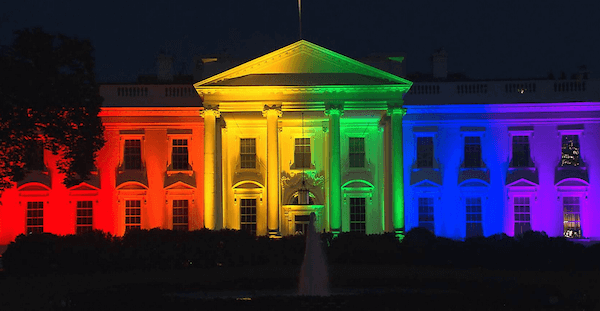Retired Texas Chief Justice Wallace B. Jefferson is taking on his former colleagues over Houston city employee same-sex spousal benefits. | TEXAS STATE DIRECTORY
On June 30, the Texas Supreme Court issued a ruling claiming the US Supreme Court’s 2015 Obergefell marriage equality decision did not necessarily require state and local governments to treat same-sex and different-sex marriages the same for government employee benefits purposes.
On September 15, asserting that his old court’s decision was clearly wrong, retired Texas Supreme Court Justice Wallace B. Jefferson and lawyers from his Austin firm, Alexander Dubose Jefferson & Townsend LLP, asked the US Supreme Court to reverse that ruling.
Jefferson, a Republican and the first African American to serve on Texas’ highest court, was appointed to that bench in 2001 by then-Governor Rick Perry, who elevated him in 2004 to chief justice, where he served until retiring in October 2013. His law firm was retained by Houston Mayor Sylvester Turner to represent the city in petitioning the Supreme Court for review.
Representing city, files challenge to ex-colleagues on reach of 2015 Obergefell ruling
The case arose in 2013 when then-Mayor Annise Parker, an out lesbian and longtime LGBTQ rights activist, reacted to the Supreme Court’s decision to strike down the federal Defense of Marriage Act by asking her city attorney whether the reasoning of that case would require Houston to recognize the same-sex marriages of municipal employees. Although Texas did not allow same-sex marriages then, some city employees had gone out of state to marry and were seeking health care benefits for their spouses under Houston’s employee benefits plan. Parker got the answer she was seeking and ordered an extension of benefits to city employees’ same-sex spouses.
Two local Republican activists, Jack Pidgeon and Larry Hicks, sued the city and Parker, seeking an injunction against extension of the benefits. They persuaded a state trial judge to issue a preliminary injunction, barring the benefits from going into effect pending the outcome of the litigation. The court relied on the Texas constitutional and statutory bans on same-sex marriage, which had not yet been challenged in court. The city appealed the preliminary injunction.
While the appeal was pending before the Texas Court of Appeals, the US Supreme Court decided the Obergefell case, and the Fifth Circuit Court of Appeals, based in Houston, promptly affirmed a 2014 marriage equality ruling by the federal district court in San Antonio, DeLeon v. Abbott, declaring unconstitutional the Texas same-sex marriage bans that had been the basis for the trial court’s injunction in the Houston litigation. At that point, the Texas Court of Appeals reversed the preliminary injunction and instructed the trial court to decide the case consistent with the DeLeon decision.
Pidgeon and Hicks appealed that ruling to the Texas Supreme Court.
After extensively considering the matter, the Texas high court announced it would deny review of the Court of Appeals ruling. This outraged Texas Republican leaders, including Governor Greg Abbott, Lieutenant Governor Dan Patrick, and Attorney General Ken Paxton, strict social conservatives all of them. The state GOP went to work encouraging people to bombard the court, whose members periodically stand for reelection, with demands that it reconsider, grant review, and then reverse the Court of Appeals. Not surprisingly, given Republican dominance in Texas politics, the pressure worked. The court did in fact reconsider and grant review of the Court of Appeals ruling.
A 2014 campaign ad for Texas Supreme Court Justice Jeffrey S. Boyd, who wrote the June 30 opinion for unanimous court. | JUSTICEJEFFBOYD.ORG
Just days before the Texas high court ruled on Pidgeon and Hicks’ appeal, the US Supreme Court underscored the clear meaning of its Obergefell ruling from two years earlier. On June 26 of this year, the high court issued a decision in Pavan v. Smith, a challenge to Arkansas’ refusal to list both members of married lesbian couples on birth certificates when one of them gives birth to a child through donor insemination. In Pavan, the Supreme Court made abundantly clear that the Obergefell decision had effectively decided the case by holding that same-sex couples had the same constitutional rights regarding marriage as different-sex couples, extending to the entire “constellation of rights” that went with marriage.
In fact, the Supreme Court did not even bother to hold oral argument in the Pavan case, simultaneously granting the petition to review an adverse decision by the Arkansas Supreme Court and issuing a brief memorandum opinion, from which three members of the court dissented in an argumentative and disingenuous memorandum attributed to recently-appointed Justice Neil Gorsuch and signed by Clarence Thomas and Samuel Alito. The Pavan opinion left no doubt that same-sex and different-sex married couples must be treated the same by government entities under the 14th Amendment.
That crystal-clear point, however, was apparently lost on the Texas Supreme Court. On June 30, its justices unanimously reversed the Court of Appeals and sent the case back to the trial court with instructions to give Pidgeon and Hicks an opportunity to convince it that the city of Houston must refuse recognition to the marriages of same-sex couples under its benefits plan, relying on the Texas constitutional and statutory bans declared unconstitutional by the Fifth Circuit Court of Appeals (based, of course, on the Obergefell decision). The Texas Supreme Court clings to the idea that constitutional rulings by the lower federal courts are not binding on the Texas state courts.
Incredibly, the Texas court suggested that the US Supreme Court’s opinion in Obergefell could be interpreted narrowly to address solely the question whether states must allow same-sex couples to marry and must recognize same-sex marriages contracted from out of state, but that it said nothing directly about what rights must be accorded to same-sex married couples.
This is, as retired Justice Jefferson’s petition to the US Supreme Court makes clear, blatantly untrue. The Texas court treats the Pavan ruling regarding Arkansas birth certificates as if Gorsuch’s dissent was speaking for the court.
Jefferson’s petition makes mincemeat out of the work product of his former colleagues, quoting clear language from Obergefell that, among other things, specifically mentioned health insurance as an example of how the denial of marriage to same-sex couples violated their fundamental right to marry and to be treated equally with different-sex couples.
This case is just as clear as Pavan was — and is likely to receive the same treatment from the US Supreme Court, unless its finds some procedural or jurisdictional reason to dismiss the petition without deciding the question presented by the city of Houston: “Did the Supreme Court of Texas correctly decide that Obergefell v. Hodges and Pavan v. Smith ‘did not hold that states must provide the same publicly funded benefits to all married persons,’ regardless of whether their marriages are same-sex or opposite-sex?”
Some have suggested that because the Texas Supreme Court was ruling only on the validity of a preliminary injunction, the matter is not procedurally ripe for US Supreme Court review, but any attempt to reinstate the preliminary injunction would directly violate the constitutional rights of Houston city employees in clear violation of the Obergefell ruling.
On a parallel track, Lambda Legal filed a federal district court lawsuit in Houston over the summer on behalf of some married gay and lesbian city employees, seeking a declaratory judgment that they are entitled to the same benefits for their spouses that their straight colleagues get. If the Supreme Court does not grant Jefferson’s petition, it is likely that the matter can be resolved relatively quickly through Lambda’s case, since the city would eagerly comply with an order by the US district court to provide equal benefits.
This entire controversy is, at heart, a dispute between the pro-LGBTQ Houston Democratic city government and the anti-LGBTQ Republican state government.



































